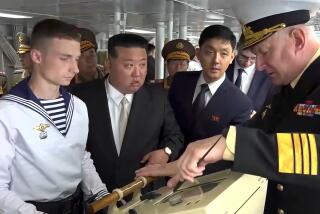Richardson’s Tour Targets How Russia Handles Nuclear Material
- Share via
MOSCOW — U.S. Energy Secretary Bill Richardson praised the “courage” of Russian authorities on Sunday after visiting a once-top-secret submarine base at the close of a tour aimed at making nuclear supplies more secure.
Richardson was taken across a foggy bay to view rows of aging, nuclear-powered submarines due to be dismantled in the port of Petropavlovsk-Kamchatsky on the remote Kamchatka peninsula in Russia’s far east.
Richardson was then shown six modern Oscar-class submarines similar to the Kursk, in which 118 crew members died when the ship sank last month in the Barents Sea off Russia’s Arctic coast.
“Seeing what we saw, which would have been unthinkable 10 years ago, represents clear progress in our continuing evolving relationships,” Richardson’s spokesman Stu Nagurka, speaking from Anchorage, quoted the secretary as saying.
“It is clear that it has not been easy for the Russians to have opened up their most secret of sites for us to see. We respect their courage and know the world will be a safer place because of the steps they and we are taking.”
Richardson was the first ranking foreigner to visit the base, where Russia hopes to create a facility with U.S. help to dismantle submarine reactors and dispose of their fuel.
He spent five days touring sites, in an effort to help safeguard nuclear materials against theft, praising his hosts’ spirit of cooperation.
Richardson commissioned two plants near the Pacific port of Vladivostok, aimed at improving security for active and spent fuel from nuclear submarines. He visited the Avangard nuclear-weapons plant in Sarov in the Volga region, part of which is to be turned into a factory producing kidney-dialysis equipment.
His tour included a stop in the former Soviet republic of Kazakhstan, which, along with Ukraine and Belarus, gave up its nuclear arsenal after the 1991 collapse of Soviet rule.
A top Department of Energy official, Rose Gottemoeller, said the trip had gone a long way to reduce risks of post-Soviet proliferation of nuclear materials.
More to Read
Sign up for Essential California
The most important California stories and recommendations in your inbox every morning.
You may occasionally receive promotional content from the Los Angeles Times.













